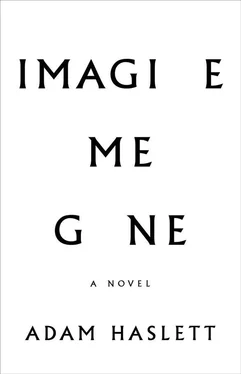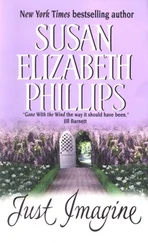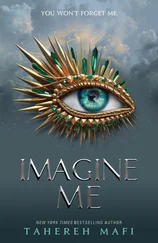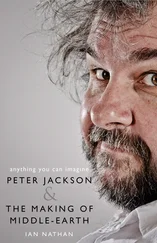I cross the street and walk into those fields. There is just a tinge of blue emerging between the branches. The shadows at the edge of the woods are retreating. At last, I have the beast out in front of me, out in the open. I sense it trying to run, to flee ahead of me into the woods. But the long night is ending, and there is nowhere left for it to hide. Not in my children’s faces. Not in Margaret’s stubborn love. Not in all my failures. There is no cover left for it on this terrain. I know its paths too well. Through the tall pines and down along the riverbank. Across the footbridge, and up through the spruce trees to where the ground levels out. I’ve come here so often trying to escape this monster. But now it is the one sapped, and limping. And I am the hunter. In the clearing overlooking the bend in the river, we come to a halt. The first rays of dawn pierce the gray light of the forest. I sit on the pine needles, up against a fallen trunk.
Invisibility. That is its last defense. That I won’t have the courage to look it in the eye. You wretch! it cries, desperate for its life. You selfish wretch! Leaving them with nothing! But it is no good. It is my prey now.
The razor opens the skin of my wrist almost painlessly. Blood runs down my palm, and along the length of my fingers. My head rolls back, and I gaze upward.
And there it is: the face of the beast — my face — human after all.
HAROLD J. BUTTERWORTHY, MD (psychiatry)
PhD (neuroscience), MPhil (geology)
MFA (metallurgy), BFA (dance)
BA (algebra) *
Patient Intake
Name:Michael
Date of Birth:January
Primary Care Physician:Mass General
Current Therapist:Walter Benjamin
Therapist’s Phone:No longer in service
What are the problem(s) you are seeking help for?
1. Fear
2. Trembling
3. Individualism
4. White supremacy
*
board certified
What are your treatment goals?
1. Ordinary unhappiness
2. Racial justice
Current Symptoms:
Yes
Personal Medical History:
Yes
Family Medical History:
Let’s not pretend either of us has time for a complete answer here. In brief, Dad didn’t make it; Mom’s never taken a pill in her life; Alec had an ulcer early on, when they were still fashionable, but has since transitioned into the back-pain industry; and I’d guestimate Celia’s chronic fatigue peaked out around ’94 somewhere in the Bay Area, though she still has Persistent Annual Lupus Scare Syndrome (PALSS) and Cryptogenic Abdominal Rash Syndrome (CARS). As for my grandparents, all four suffered from Eventual Death Syndrome (EDS).
Have you ever been hospitalized for nonpsychiatric care or surgery?
On Christmas Eve 1992, I came down with a self-diagnosis of esophageal cancer requiring what amounted to an overnight stay in the decongestant aisle of a twenty-four-hour CVS in Medford.
Please briefly describe your educational background:
The usual grade-school misery. Though a boy named Ralph eventually befriended me over Star Trek and the music I played him. Funkadelic’s “America Eats Its Young,” for instance. When I heard George Clinton ask, Who would sacrifice the great grandsons and daughters of her jealous mother by sucking their brain until their ability to think was amputated by pimping their instincts until they were fat, horny, and strung-out in her neurotic attempt to be queen of the universe? Who is this bitch? (read: America), it struck me that our fifth-grade curriculum was somehow incomplete. I thereafter spent every nickel of my allowance on funk. This being 1978, there was a lot to catch up on: Curtis Mayfield, Gil Scott-Heron, everything by James Brown. I listened to records in every spare hour, including while I did my homework, and on my headset after I’d “gone to bed.” I couldn’t be certain what it meant to “Give Up the Funk” or “Tear the Roof Off the Sucker” or why Parliament would title an album Mothership Connection . But I had my first secret joy at knowing that beyond the veil of the apparent, meaning ached in the grain of music. A joy accompanied by my first intuition that black people might know a thing or two about the need for that meaning — history being the culprit. The only affective correlative of such history I had thus far experienced being the queasy feeling I’d get in my stomach watching my grandmother show extra politeness to black people on the rare occasions she encountered them, in order to make very clear that she was not affiliated with those terrible, other white people who hated and mistreated them, success being when a black person smiled back at her, acknowledging her politeness and her goodness, thus completing the blameless circle of liberalism.
As for high school, moving overseas and returning less than three years later didn’t much help. Nor the premonition I had that second autumn we were back in Massachusetts, in the woods where my father later disposed of himself. My family has an unfortunate habit of taking walks: my father by upbringing, my mother by faith in the medicinal quality of fresh air, Celia because of an idiopathic athletic streak, and Alec, as ever, in affectation, dolled up like some child earl, all tweed and Wellingtons. My mother was the one who nettled me into compliance, nagging me to abandon my station at the turntable and accompany, on that particular day, Celia and my father on a walk with the deracinator, who scurried off her leash like a giant swamp rat in heat. It was a Sunday afternoon in November (don’t ask me for a nature description; there were trees, a path, etc.). We got to some kind of clearing. I was bored and hoped we would turn around soon. The fornicator had vanished down a landscape feature. Celia had gone after her. My father sat on a fallen tree. A general pause set in.
The horror was brief, a few seconds. Flayed bodies swarmed in front of me in a bloody, contorted mass. I looked up and away trying to evade the menace, but it was pressing down from above, filling the circle, thriving on its own gore. Years later, when I came across the paintings of Francis Bacon, and saw those innards turned outward but still alive, it struck me that the man understood. As in his Three Studies for Figures at the Base of a Crucifixion, with those mouths agape at the end of nearly human limbs, testifying not to physical suffering but the bleeding of the mind. At the time, however, I just went cold, my mouth dry as chalk. And I knew evil was seeded in that place, waiting to bloom.
I don’t particularly believe in a spiritual world, other than music. I’m a materialist to the bone. But I had the overwhelming sense of needing to escape whatever it was that dwelt there. I hoofed it home like a ghost from its enchanter fleeing. I couldn’t sleep that night or the next. I watched my father and Celia for signs that they had sensed it too, but they behaved as if nothing had happened.
For months, I’d been pleading to be allowed to go back to England to finish my schooling with my friends. Now I had no choice. I had to get away. I stopped asking about it and just called my friend Simon, who said I could live at his house, and then I told my mother and father I would be leaving after Christmas. To my surprise, they no longer protested. In fact, they seemed relieved. I realized their previous resistance had had nothing to do with me. They just didn’t have the organizational wherewithal to cope with my demand. As soon as I lifted that burden from them, they folded like a cheap umbrella. And so I left them there, my family, without ever warning them, without ever telling them what I’d seen. Left them to face it on their own. An act for which I’ve never been able to forgive myself.
Читать дальше












